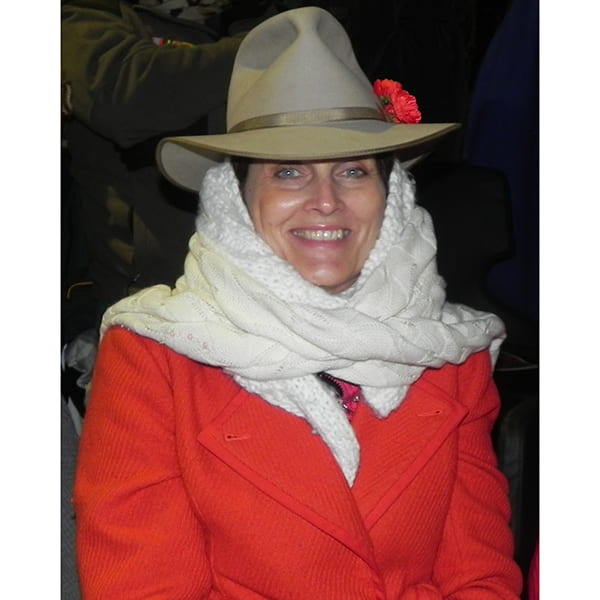As a sickly child, Margaret Strike didn’t think she’d live long enough to travel and see the Egyptian pyramids she read about in books. It was the beginning of a long struggle with health, confidence and finding her feet.
—————
“I was an average student at school, but my favourite subject was history. When I was young, I was seriously ill a couple of times and my parents were warned that I wouldn’t survive to my teens. During those times, my parents would give me books to read. They’d give me history books and I can remember being fascinated by the pyramids and dreamed that one day I’d see one. However, I don’t think I really thought that would happen.
“I married young and later had three children. I was heavily involved in volunteer work with the Duke of Edinburgh’s Award, the State Emergency Service and then as a volunteer firefighter. But by the time my marriage broke down, I was over fifty, hadn’t participated in education beyond Year 12, and had been out of the workforce for over 30 years. I had virtually no self-confidence.
“A relative suggested that I consider becoming a genealogist or do something with family history as I was passionate about it. Years earlier, I’d been introduced to family history by a cousin. At first, I thought it was incredibly boring, however, I liked the challenge of solving puzzles and very quickly, I was hooked. So, blissfully ignorant of critical thinking, essay writing and what academic study was, I applied.
“I looked at several universities but UNE had the Advanced Diploma of Local, Family and Applied History and I thought that would be ideal. I also liked the fact that I could study the whole diploma online. Undertaking a degree was never on my radar as I thought that was for really smart people.
“I almost gave up university after my first trimester. I spoke to one of the support staff from UNE to see how I could quit, and she gave me the best advice ever. She suggested that rather than quit, that I just ‘do one, do well’. That was a game changer. I really threw myself into my studies, and it became the one thing I was doing well when everything else in my life at that time was difficult. After achieving high distinctions, I began to think that maybe I could do a degree.
“I’d looked at the Bachelor of Historical Inquiry and Practice several times to see what I’d have to do. I liked the subjects on offer and decided to change from the diploma to the degree and go for it. I plodded along with my studies until I thought I could cope with two units again.
“I’ve enjoyed seeing just what I’m capable of, and interacting with other students online. In my courses, I think the best thing was being able to watch the lectures and see the lecturer. It felt like I was in the room as well. I particularly enjoyed attending the workshops as it was nice to interact with other students and the lecturers in person.
“When I completed my degree last year, I was stunned to learn that I’d won three history prizes, on top of several Vice-Chancellor’s Scholar Awards. I really couldn’t believe it. My degree had taken six years but during that time, my life had turned around. I’ve grown in confidence, and no longer limit my expectations of what I can achieve.
“One of my lecturers, Associate Professor David Roberts, suggested that I consider an honours degree in convict history. I was excited and decided that I would take this next step.
“I’m undertaking a longitudinal study of a cohort of over two hundred convicts from 1815-1821 sent to Newcastle penal station as secondary punishment. I like that I am researching the individuals rather than statistics. I’ve been able to follow these men through the penal system, and then where possible, find their fates. This period is also an era of Van Diemen’s Land legal history that has been largely unexplored. I’ve enjoyed exploring secondary transportation and the magistrates’ idiosyncratic sentencing practices. Particularly interesting has been the opportunity to work with the convict conduct records. I absolutely love research and I easily lose track of time while delving into archival records! The challenge now is to synthesise the information into a concise argument.
“History is more than just satisfying a curiosity about the past. I think it helps satisfy an innate desire to not only understand humanity’s multi-faceted story, but also, to understand how that story influences the identities and choices of people today.
“After I complete my honours degree, I intend to further my studies and complete a PhD. My goal is to be a historian and I believe that this is the next step for me to take to achieve that goal.
“My maternal grandmother used to tell me that ‘knowledge is no load to carry’. I’ve remembered her words, and I understand what she meant now. They inspire me to keep studying and do the best I can.
“Oh, and back in 2009, I did go to Egypt and see the pyramids and it was quite special. As I touched the walls I remembered reading about this place when I’d been young and sick. It felt quite surreal and I said, ‘I made it!’”



Recent Comments